Key takeaways:
- Folklorists serve as storytellers and guardians of cultural heritage, connecting community identity through shared narratives.
- The town’s folklorist has a rich background in anthropology and cultural studies, enhancing his storytelling with global insights and local significance.
- Participating in folklore events fosters a profound sense of belonging, enabling community members to connect through shared histories and experiences.
- Storytelling creates emotional bonds, encourages vulnerability, and preserves cultural heritage, enabling future generations to inherit their community’s identity.
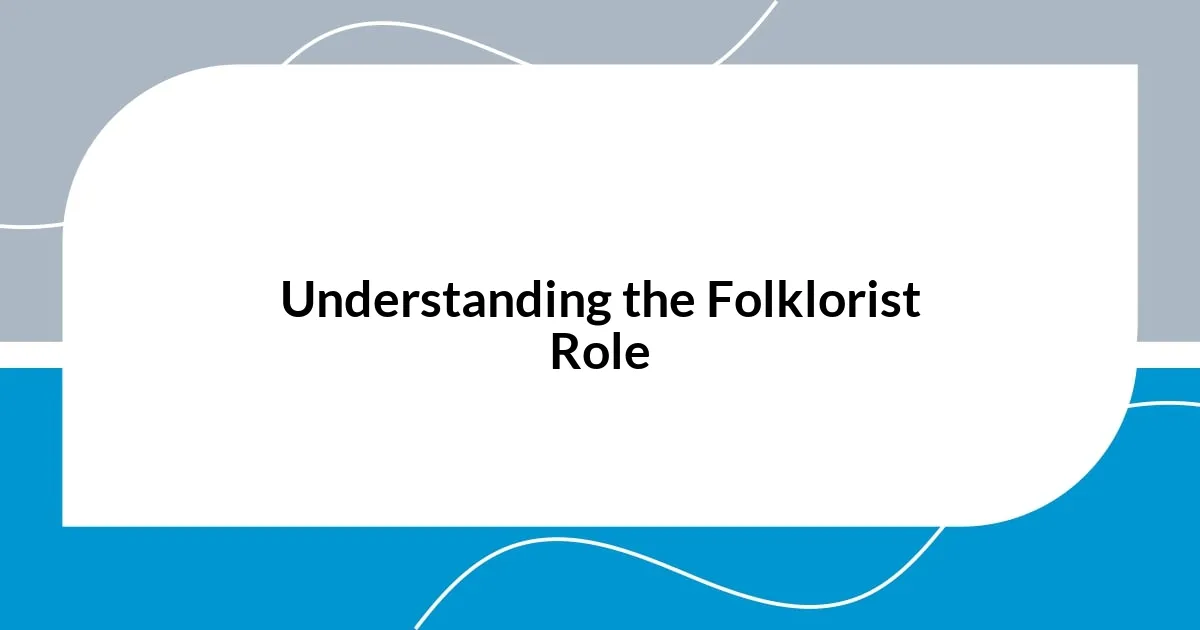
Understanding the Folklorist Role
The role of a folklorist is fascinating and multifaceted; they are essentially the storytellers and guardians of cultural heritage. I remember my first encounter with our town’s folklorist, who invited me to a storytelling session. It struck me then how much passion he infused into each tale, transforming folklore into living, breathing narratives that connected our community’s past with the present.
Folklorists don’t just collect stories; they interpret them, bringing deep meaning to traditions that might otherwise be overlooked. Have you ever wondered how a simple folk song can encapsulate the struggles and triumphs of an entire community? I felt a surge of pride when I realized that these stories shape our collective identity, tying us together in shared experiences and emotions.
Moreover, their work often extends beyond just observation; folklorists actively participate in cultural events, celebrating and revitalizing local customs. One sunny afternoon, I joined a festival where our folklorist led a workshop on traditional crafts. I was amazed by how his enthusiasm inspired both young and old to engage with their heritage, reminding me that folklore is not just history—it’s a vibrant part of who we are today.

The Town’s Folklorist Background
The town’s folklorist, known for his extensive knowledge and passion for local history, has roots that run deep in our community. Growing up here, he spent countless hours listening to the tales passed down through generations, nurturing a love for storytelling. I remember once sitting in a cozy local café, where he recounted how listening to his grandmother’s stories sparked his lifelong journey into folklore, and I couldn’t help but feel a sense of nostalgia wash over me as he reminisced about his childhood.
His background is impressive; he holds degrees in anthropology and cultural studies, which equip him with unique insights into our town’s diverse cultural tapestry. I recall attending a lecture he gave on the origins of our town’s most cherished legends. His explanations illuminated the deep connections between our regional identity and these stories, emphasizing how they reflect our values and beliefs. It was during that session that I realized folklore is not just entertainment; it’s a vital thread woven into the fabric of our community.
Interestingly, he has traveled extensively, studying various folk traditions and practices around the world. This experience enriches his work in our town, giving him a broader perspective that enhances his storytelling. One evening, I listened as he compared a local folk tale to similar narratives from other cultures. It was eye-opening to see how universal themes of love and struggle emerge in different contexts, reminding me of the shared human experience transcending geographical boundaries.
| Aspect | Details |
|---|---|
| Education | Degrees in anthropology and cultural studies |
| Community Role | Storyteller and guardian of cultural heritage |
| Local Influence | Hosted storytelling sessions and cultural workshops |
| Global Experience | Studied folklore traditions worldwide |
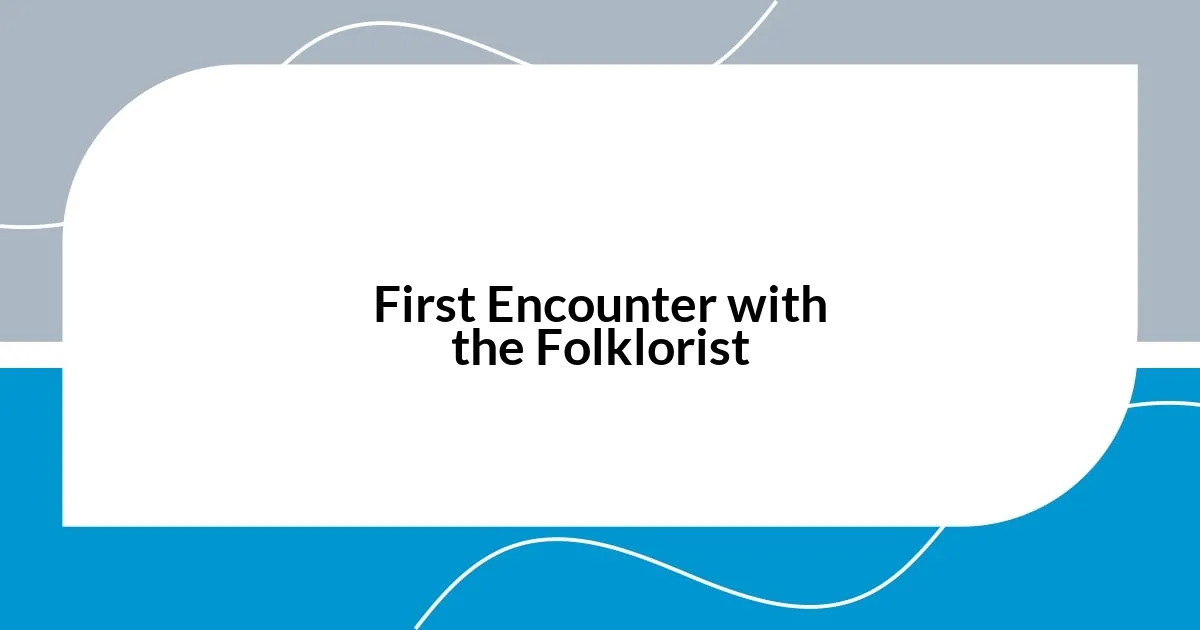
First Encounter with the Folklorist
The first time I met the town’s folklorist, it was at a quaint little park during a story-sharing event. I was drawn in by the laughter of children and the captivated faces of adults as he spun tales that felt both ancient and strikingly relevant. What really stood out for me was the way his eyes sparkled with excitement when he recounted a local legend about the hidden treasure of Old Man Jenkins. I felt an instant connection, as if I was sitting around a campfire with friends, sharing secrets.
- He greeted everyone warmly, effortlessly making newcomers feel welcome.
- I noticed how he seamlessly blended humor with poignant moments, creating a tapestry of emotions.
- Each story he told was accompanied by gestures that brought the characters to life, making me laugh and gasp in disbelief.
- The atmosphere was electric, as if we were all part of a collective memory being unearthed.
After that day, I couldn’t help but seek him out at different events, each encounter deepening my appreciation for the rich history he shared. The way he recounted tales that often reflected the struggles and joys of our community instilled a sense of unity within me. It sparked an urge to uncover more about my own roots, and I left with a refreshed perspective on the importance of storytelling in preserving our culture.
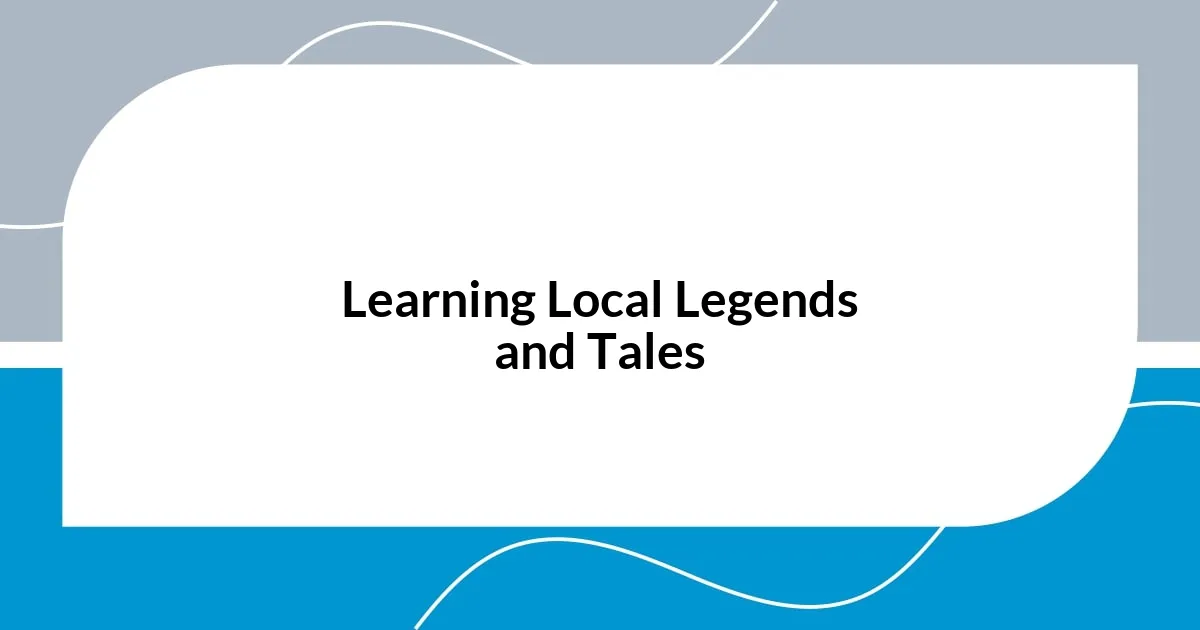
Learning Local Legends and Tales
As I delved deeper into the local legends with the folklorist, I realized how much these stories resonate with our everyday lives. One evening, I sat with him and a small group under the stars as he shared the tale of the weeping willow by the town square. He described it as a symbol of love lost and the resilience of the human spirit. It struck me—how often do we find ourselves feeling like that willow, standing strong even in the face of our own losses?
Listening to him recount tales rooted in both reality and myth, I found myself reflecting on my own experiences. His vivid descriptions sparked memories of my grandmother’s stories about our family. Have you ever felt a story connect so deeply that it makes you reconsider your own journey? I felt that connection vividly, and it dawned on me that these local legends are more than just old wives’ tales; they encapsulate the very essence of who we are as a community.
During one of his storytelling sessions, I encountered the legend of the Lost Lantern. As he unraveled the tale, the room seemed to buzz with collective curiosity, each listener hanging onto his every word. I remember a young girl beside me gasping as he revealed the lantern’s significance—a beacon of hope for lost souls. That moment encouraged me to think about the “lost lanterns” in my own life—those moments of guidance and inspiration that have helped me find my way. It was a beautiful reminder that while our town’s tales may be steeped in folklore, their messages are timeless and can light our paths even today.
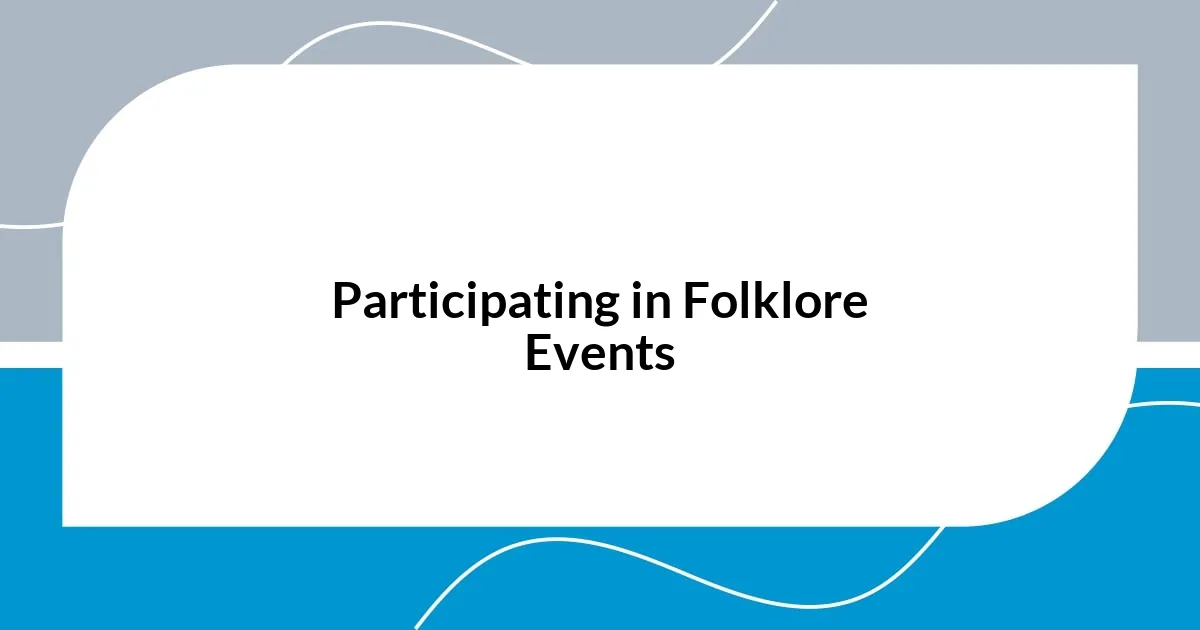
Participating in Folklore Events
Participating in folklore events has been a transformative experience for me. I remember attending a harvest festival where local artists performed traditional dances while the folklorist narrated stories of our town’s agrarian past. This vibrant setting felt like stepping into a living museum, and I could sense the magic of our history weaving through each performance. Have you ever felt the pulse of your community in such a tangible way?
Another memorable occasion was a folklore workshop where we crafted our own stories. I was nervous at first but quickly found camaraderie with other participants. As we shared our narratives, laughter filled the air, turning moments of vulnerability into powerful connections. That day taught me that storytelling isn’t just about the tales we tell; it’s about the bonds we form. Who would have thought that sharing personal experiences could make you feel so alive and connected?
I also appreciated how folklore events invited people of all ages to participate. During a recent storytelling night, I watched children’s eyes widen in wonder as they listened to tales of mythical creatures. It reminded me of my childhood, sitting by the radio, captivated by the adventures recounted in the stories my parents played. Participating in these events has rekindled that same sense of wonder within me. Isn’t it incredible how these gatherings can bridge generations and keep the tales of our ancestors alive?

Insights Gained from the Experience
One of the key insights I gained from my time with the folklorist was the profound sense of belonging that these stories foster within our community. I recall a chilly evening when we gathered for a fireside storytelling session. The warmth of the flames mirrored the growing connection among us as we shared our interpretations of familiar tales. Have you ever felt that electric charge in a room where everyone is united by a shared history? That evening, I truly appreciated how folklore can create an invisible thread tying us all together.
Another important realization was how these legends serve as mirrors reflecting our hopes and fears. During a discussion on the tale of the haunted mill, I found myself sharing my own fears about change and uncertainty in life. This led to a powerful exchange, where others opened up about their challenges too. Isn’t it fascinating how storytelling encourages vulnerability? In that moment, I recognized that these narratives not only entertain but also provide a safe space for us to confront our struggles together.
Through these experiences, I also came to understand the importance of preserving our cultural heritage. I remember sitting with older townsfolk who recounted stories of their youth, their faces lighting up with nostalgia. Listening to them made me ponder: how can we ensure that future generations will know these tales? It struck me that preserving folklore isn’t merely about maintaining traditions; it’s about passing down wisdom and values that shape our identity. There’s something beautifully profound in realizing that our stories are our legacy, and I’m now more motivated than ever to help keep that legacy alive.
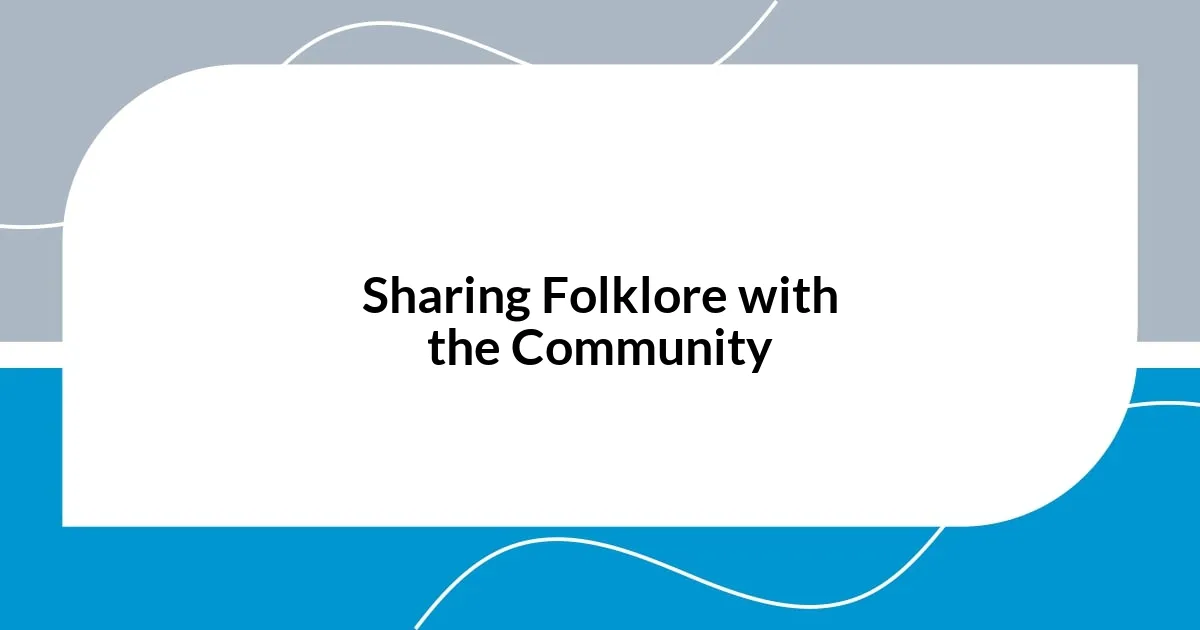
Sharing Folklore with the Community
Sharing folklore with the community has become a ritual that brings us together in surprising ways. I vividly recall an evening at the community center, where families gathered around to listen to tales spun by our local folklorist. The atmosphere was electric, each story igniting laughter, gasps, and moments of shared silence. Who knew that simple tales could provoke such a strong sense of unity among strangers?
On another occasion, we organized a folklore exchange program, inviting community members to bring their own stories. I remember a shy neighbor sharing a legend handed down through generations. As she spoke, I noticed her confidence grow, and soon, our entire group was rapt in attention. This experience highlighted for me the transformative power of storytelling; it literally breathes life into the storyteller while weaving a fabric of connection among listeners. Isn’t it incredible how sharing our narratives can open up pathways to understanding one another?
What truly resonates with me is the emotional weight these stories carry. There’s something profound about listening to tales that echo our own lived experiences. During a recent gathering, a fellow participant recounted a tale of hardship and triumph, which mirrored my own struggles. There, amidst the flickering candlelight, I found solace in knowing that we were not alone; our stories are intertwined, steeped in shared emotion and resilience. Have you ever felt that connection through storytelling? It’s moments like these that remind me why sharing folklore is essential for nurturing our community spirit.